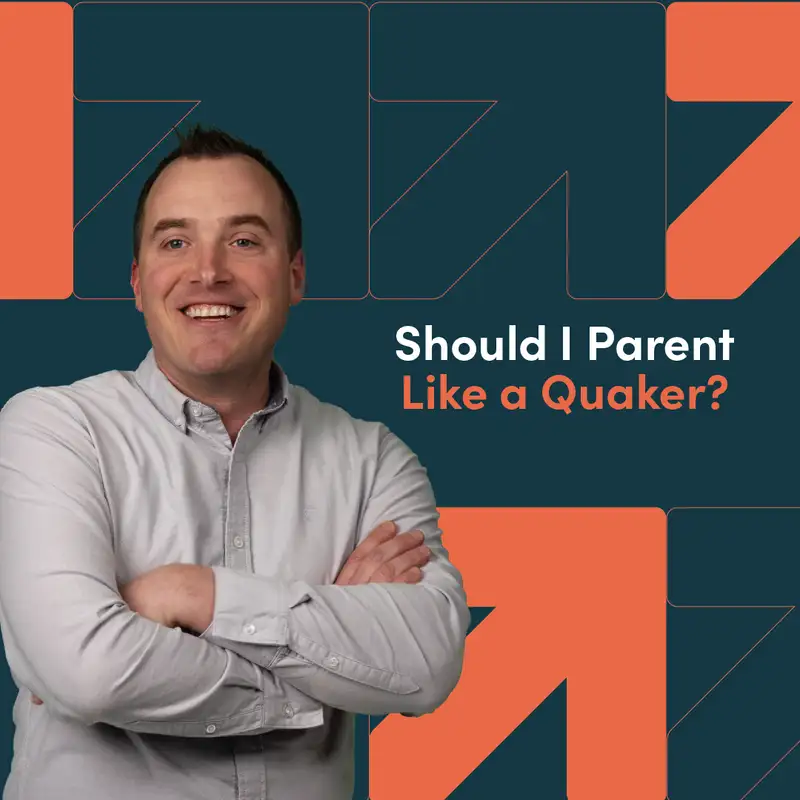Should I Parent Like a Quaker?
Hello, everyone. Thanks for listening to wake up, look up, a podcast where we connect events happening in real time to the gospel of Jesus Christ. I'm Zach Weihrauch. And in today's episode, we're asking the question, should I parent like a Quaker? This is prompted by an article that was in the Atlantic this week about how Quaker parents have been ahead of their time.
If you're not familiar, Quakers, are a religious sect. Originally, which would have considered itself Christian, now has become a little more, ecumenical in its approach so that Quakers are really a a way of approaching life. You could be a Muslim Quaker, a Christian Quaker, a Hindu Quaker, but originally a sect of Christianity. And they had a very nontraditional approach historically to parenting. Things like, for example, questions are greater than commands.
That one of the chief jobs of parents is to raise kids who are autonomous, who can stand on their own, which means it's more important to draw out a child's thinking than it is necessarily to make sure they're doing it the way you want them to do it through your commands. A firm kind of discipline, even an authoritarian approach that reinforced I am the parent and you are the child. Also an approach that emphasized kids' strengths. Drawing from the Christian tradition of spiritual gifts, Quakers help their kids to uncover their god given abilities and talents and then to lean into them. And finally, the last significant part of Quaker parenting is to understand that the most effective tool a parent has is their own life.
So parents are meant to model their morality, model humility, the ability to admit when you're wrong, all those kinds of things. What the article in The Atlantic was doing is they were saying that that over the last fifty or sixty years, there have been a variety of approaches to parenting, new age approaches, empowerment approaches, dictatorial approaches. But what has stood the test of time is that these Quaker principles, actually according to to science, are showing us to form the best kinds of children. Quakers, in the end, got it right. Now, if you're listening to this, you're probably not a Quaker, but my point in bringing this up is that really what the author unintentionally is drawing attention to is not so much that the Quakers were right about parenting, but that the Bible was right.
One of the main things I try to do on this podcast is to increase your confidence in the Bible as your authority. As a Christian, to increase your confidence that the Bible isn't just telling us what God wants as though God's up there in this in heaven throwing a dart at a dartboard and saying, oh, it turns out you should tell the truth. That's what I'm gonna require. But that God is actually giving us the way life works, leading us to human flourishing. And the principles that the author is pulling out from Quaker parenting are actually biblical principles.
Like, for example, to understand that your children, at least according to Genesis one, are image bearers of God. They are not projects to solve or problems to manage. They're image bearers. They are imbued with reason, with creativity, with giftings, and your job is to teach them how to celebrate those things, how to have gratitude towards the God who gave them those things, and how to teach them how to manage those things. That's a biblical, not Quaker principle.
God's design, at least according to Ephesians six four, is that discipline and love would be the tool of parents. That God does want firm parents, parents who reinforce for their children that where God gives authority, it is for their good. And the authority of a parent comes through in discipline, but the discipline is firm, but not angry, firm, but not aggressive. That's because the parent is always holding their responsibility to god as an authority figure, but also their responsibility to god to love the image bearer that they are raising. The Bible reinforces time and time again both boundaries and freedom, teaching people how to live out a heart for God and their neighbor, but stopping short of imposing arbitrary legalism on people.
The Bible's encouraging us to teach our children, at least according to first Timothy four, to live their faith out loud, to actually have a faith that articulates itself in the choices that they make, including the way we live in front of our children. That we would echo what the apostle Paul said, imitate me as I imitate Jesus. And, of course, the idea that children have been given gifts from God is a biblical one. Ephesians two ten says that God we are his workmanship, and God has created us for good works in Christ Jesus. My point is this.
We're so tempted to go everywhere and to everyone else other than God for the how to's of life. But the people who listen to God, the people who go to God for wisdom are the people who in the end are proven to be wise. God wants your home to function well. He wants you and your children to flourish. So go to him and ask what he thinks you ought to do as a parent.
Hey, thanks for watching this episode of Wake Up Look Up. If you enjoyed it, please help us get the word out by sharing it with someone you think might benefit from it. And while you're here, make sure to subscribe to our YouTube channel to get further content or even download the CCC app where you'll find even more resources to help you grow in your faith and relationship with Jesus Christ.
Have an article you’d like Zach to discuss? Email us at wakeup@ccchapel.com!
Creators and Guests


